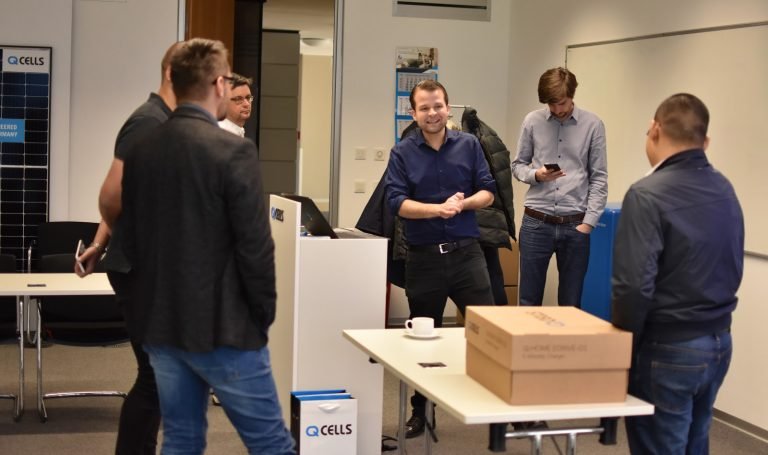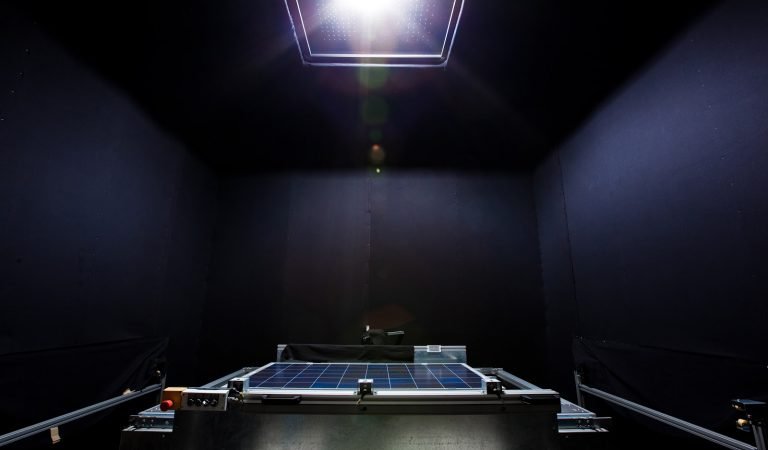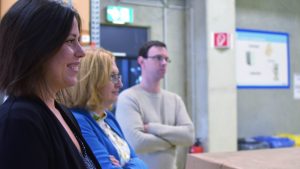A Visit to Q CELLS’ Technology and Innovation Headquarters
As a prominent PV manufacturer dedicated to creating high-quality modules, Q CELLS is continuously improving its range of products. Their strong technical expertise is key when it comes to rigorously developing and testing their latest innovations in four R&D centres around the world.
Q CELLS’ Technology and Innovation headquarters is in Thalheim (Germany). This R&D centre is devoted to the development of new solar cell technologies and manufacturing processes to improve power energy yield and reliability.
Since Talheim is not far from Solarity’s headquarters (Prague), a dozen of our employees went to visit Q CELLS’ R&D centre in February. Here is a summary of our visit and some interesting facts we would like to share with you.

Can you see the solar panels on the facade? 🙂
PV Trends & Facts
Thanks to Q CELLS’ representatives, we had the opportunity to learn and discuss new future trends and technologies that are being developed by the company.
During our conversations, Q CELLS declared their continuous effort to improve the efficiency of solar cells by experimenting with state-of-the-art technologies such as multijunction tandem structure. This technology would take advantage of Q CELLS’s finest silicon cell combined with another material on top to harvest more power from the sunlight spectrum.
All this new information we gained confirmed to us that Q CELLS is dedicated to offering durable and high-quality products. To prove this commitment and provide technical assurance, they offer a 25-year warranty on premium products which is considerably higher than the market average (about 10-12 years).

Q CELLS' R&D centre
Before introducing new solar panels on the market, products must pass several strict assessments. The testing process, which can take up to several months, is crucial to determine performance, quality, and safety requirements of solar panels.
Standard tests and certifications are required by state and local regulatory bodies. However, Q CELLS takes it a step further. To assess different new materials and technologies meticulously, they introduced additional stress testing techniques to ensure high-quality standards, even in harsh environments.
Here are five examples of testing techniques that visitors can see with their own eyes in the R&D centre:
Solar Panel Testing Techniques
1. Climate testing
Tests take place in several climate chambers with different characteristics in terms of temperature (from -40 to 85 degrees Celsius) and humidity levels.
Interesting fact: A testing chamber where the temperature goes from -40 up to 85 degrees Celsius is much harsher with high humidity.

2. Hail testing
Specially created ice cubes are thrown against the solar panel. The R&D centre makes the ice on-site.
Interesting fact: Making ice cubes is not as easy as it seems. If the ice is simply made from frozen water, the cubes break too easily for usage in experiments. There are two options to produce ice cubes: by using a specific machine (times range around a week), or by cutting them from a larger ice cube.
3. Mechanical testing
Snow load testing modules up to 15 000Pa.
Interesting fact: Thinner solar panels with more flexible frames are more resistant to weight testing. It allows the panel to bend, which avoids putting too much stress on the frame.

4. The breaking point
Examining at which point the module brakes with a 42kg ball that hits the module.
5. Lightroom
Testing the efficiency under sunlight conditions.

More visits to come
We are more than pleased to have visited Q CELLS’ R&D centre as we have acquired new knowledge from true PV experts. When the lockdown is over, we are sure to organize another visit with all interested clients. Until then, stay safe!
More about the global PV trends in 2020 >>
More about Q CELLS >>
Posts you might like:

Subscribe to our newsletter
so that you don’t miss any news!















